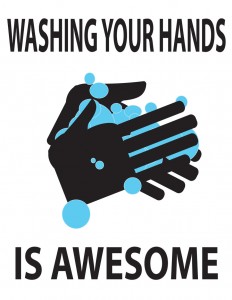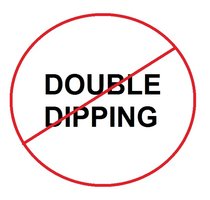Welcome to the next installation of FAQs oriented blog posts about the business end of Beauty services and why hiring a seasoned Beauty Artist is the best way to ensure a quality experience. Today’s topic is one that most consumers are not aware of that is very important but often overlooked: SANITATION. What does sanitation have to do with giving good face? Read on after the jump…
One of the most important elements of professionalism in the Beauty field is proper safety and sanitary procedures to protect the health and well being of both the client and practitioner. Proper health and sanitation standards include procedures for inhibiting growth and transmission of bacteria by maintaining clean hands, tools, products, and work environment. *The knowledge and implementation of the proper sanitary procedures is just one of many elements that separates a true Beauty Professional from a hobbyist, but the difference can have a huge impact on not just the price you pay for the service, but also on the quality and safety of that service.
My top 4 Tips To Avoid an Unsafe Makeup Artist:
1) Before an Artist touches your face or hair, they should always wash or sanitize their hands.
In addition to airborne transmissions, a great number of germs are picked up and transmitted on our hands by touching high traffic everyday items door knobs, light switches, computer keyboards, etc. Hands should also be sanitized or washed between services and after touching their own face or hair as well as after eating or drinking.

2) Pay attention to the Artist’s kit and set up, not for high end brand names, but for telltale signs of unsanitary conditions.
Are there smudge marks and fingerprints all over the container? Residue, hairs, or other fibers stuck in or around the product? Are there products all over the place without proper lids or caps, exposed to open air and thrown into a bag or case? Is their workspace messy and dusty with powder fallout and used implements and hair strewn about? Do their brushes look used or not quite clean with product residue or someone else’s hair on them? Is there glue residue already stuck to the lashes they are about to apply on you? STOP RIGHT THERE. This is a potentially unsafe situation putting your health and appearance in jeopardy. Improper storage, handling, and sanitation of products and implements can cause acne as well as serious conditions such as a demodex infestation that can cause rosacea, boils, or loss of eyelashes or brows, pink eye, staph, and even herpes. That inexpensive (and perhaps by extension, inexperienced or untrained) Artist you found on Craigslist or Thumbtack for a “too good to be true” price may end up costing you more than you bargained for down the line with trips to the doctor for long term medications or treatment for permanent facial scarring due to deep infection. If you would turn your nose up at a restaurant with a dirty dining room, remnants of food stuck to the silverware, and lip prints on the glasses then apply the same reasoning to your makeup or hair service; you can get sick. If you observe any of the aforementioned conditions you have a right to stop the service and refuse further progress.
3) Don’t let an Artist use the same brush on you as they have on 6 people right before you.
The surface of our skin is covered in bacteria, some good and some bad. A 2012 study that started as a goof in a biology lab swabbed out 60 people’s navels and discovered that each had a completely unique bacterial flora and content. The team found 2,368 bacterial species, 1,458 of which may be new to science. The takeaway? Wash your belly button, and sharing is not always caring. Personally I am averse to the idea of having someone else’s bacterial cocktail swabbed and buffed all over my face into my pores and around my eyes. Using the same makeup brushes without sanitizing in between them is lazy, not to mention completely unsanitary unless the brushes are properly disinfected in between uses. Usually disinfecting solutions are sprayed onto a used brush which is then wiped clean on a clean (paper or terry cloth) towel and allowed to sit according to manufacturer’s directions for use while the solution kills microbes and then dries.
4) Double dipping or applying lipgloss or mascara direct from the tube: NO.
Just no. Unless you provided or plan to buy that mascara or lip product that has been used exclusively on you, the applicator that comes with the packaging should never touch your face and then be reinserted into the tube. If the Artist plans on using the product on you and then returning the wand to the package for later use on other clients, imagine how many eyes and lips it has touched before yours, all while sitting in a creamy microbial stew of other people’s skin bacteria. Felling grossed out? You should! Disposable wands/spoolies or a brush should be used for each application, and the wand or brush should never be reinserted into the tube after use. Product should be doled out onto a palette or sanitized surface and then picked up from there without double dipping directly into the tube.

5) If an Artist comes at you with a pencil that looks used or dull, ask them to sharpen it for a clean line and a clean application.
Lip and eye pencils are easily sanitized by applying alcohol and sharpening them. There should be no residue from previous use on the sharpener. If there is, the blade and inner chamber should be swabbed out with alcohol. Then the pencil should be sprayed with alcohol or makeup sanitizer (to avoid recontaminating the blade and therefore the fresh nib) and then sharpened.
Some states require that someone acting as a Hairstylist or Makeup Artist servicing weddings be a trained and licensed Cosmetologist or Esthetician to ensure that the practitioner has received adequate training in proper safety and sanitary standards, and other states do not. If you are unsure of how to find a trained/licensed professional in your area where this is required, try reaching out to local beauty schools for a list of graduates in good standing for a referral.
*Licensed/trained beauty professionals are not medical professionals and correct adherence to these guidelines does not guarantee with 100% certainty that someone will not break out after a makeup application, as break outs can be caused by a number of factors including a reaction to ingredients in the product. If you have any allergies or suspect sensitivity to certain ingredients, let your Artist know beforehand what your reactions to those ingredients or certain products are to minimize the chance that your skin will react. Immune compromised individuals or those under the care of a physician for eye or skin disorders or issues should advise their Beauty Artist of any such care or related medications to avoid any potential side effects or to allow for proper accommodation for any special needs (i.e. inclusion of a sunscreen factor in makeup application for an outdoor event if you are taking medications/experiencing a condition that thins the skin or causes photosensitivity). This article is not intended to be medical advice nor does the author claim to be able to diagnose or treat any medical conditions resulting from Beauty Services.

